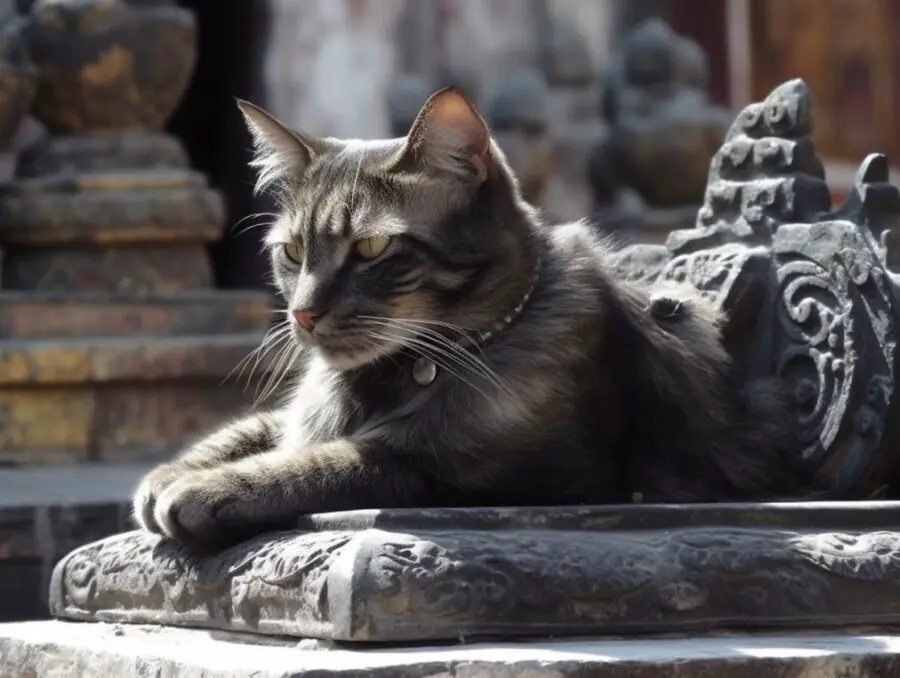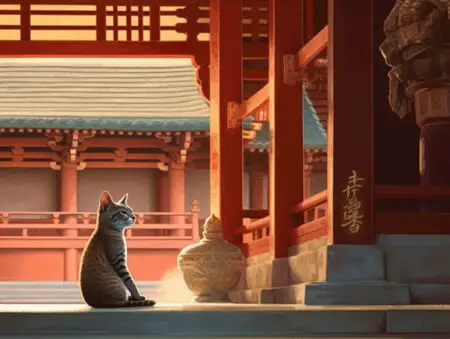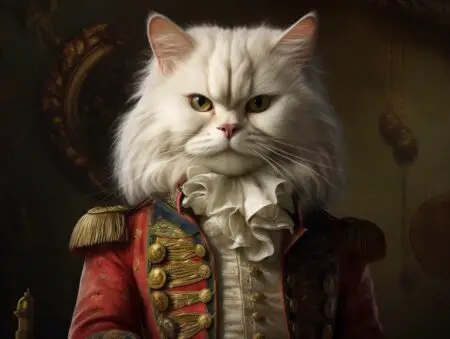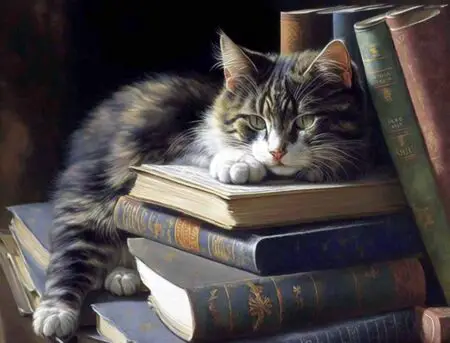From ancient Egyptian civilizations to contemporary internet culture, cats have enjoyed a unique status among animals. Among the various traditions and cultures that appreciate these graceful creatures, Hinduism has its own perspective on cats.
Let’s explore the role of cats in the Hindu religion, their symbolic significance, and their place in Hindu mythology and practices.
Exploring the Symbolism of Cats in Hindu Culture
From Hindu beliefs about cats to their portrayal in mythology, the feline species holds a unique place.
Like many animals, cats are regarded with a mix of fascination and superstition within the vast fabric of Hindu culture that’s influenced by a blend of religious symbolism, folklore, and societal beliefs.
- Symbolism: In Hindu culture, every animal is associated with certain symbolic attributes. Cats are often associated with independence, agility, and mystery due to their elusive nature. For example, the goddess Durga is often depicted with a lion, a feline family member, symbolizing strength and power.
- Folklore: Various regional folklore and tales in India feature cats. For instance, the ‘Panchatantra’—an ancient Indian collection of fables—includes tales about a cat’s cunning nature. These stories, passed down through generations, contribute to the cultural fascination with cats.
- Superstitions: Cats, particularly black ones, are often surrounded by superstitions in many societies, including India. For example, a common belief is that it is unlucky if a black cat crosses your path. Although not based on religious texts, these superstitions have become embedded in societal norms over time.
- Sacredness: In some Hindu temples, cats are considered sacred and bring good luck. They are well cared for by the temple caretakers and loved by the devotees, further elevating their status.
The Historic Role of Cats in Hindu Religion
In ancient times, cats were considered symbols of independence, beauty, and mystery.
Cats are revered for their agility and hunting skills and are often associated with warrior qualities.
Moreover, cats in Hindu mythology have sometimes been related to goddesses that embody these traits.
Decoding Feline Symbolism in Hindu Beliefs
In Hinduism, every animal is linked to a certain deity and carries a spiritual symbol.
Cats, particularly black ones, are often related to the planet Saturn or ‘Shani,’ representing the ability to overcome challenges and triumph over darkness.
However, they can also be associated with various superstitions, indicating the complexity of feline symbolism in Hinduism.
Cats in Hindu Mythology: Deities, Legends, and Folklore
In the rich tapestry of Hindu mythology, cats and feline creatures find prominent mentions.
Hindu Goddesses and Their Feline Associations
The goddess Durga, a symbol of power and the vanquisher of evil is often depicted riding a lion, a member of the Felidae family.
This portrayal of the goddess signifies power, courage, and righteousness.
Another mention of a feline creature is in the story of Narasimha, an avatar of Lord Vishnu, who takes on a half-man, half-lion form to destroy a tyrant king.
Feline Creatures in Hindu Sacred Texts
Hindu sacred texts often illustrate moral and spiritual teachings through stories involving animals, including cats.
An example is the ‘Panchatantra’—an ancient Indian collection of fables—where a tale features a cat feigning devotion to trick a bird.
Practical Implications: Cats in Contemporary Hindu Practices
Cats are not just limited to the realm of mythology; they have a tangible presence in Hindu religious practices and beliefs today.
Cats and Their Sacred Place in Hindu Temples
A few Hindu temples in India have cats as their inhabitants.
In Hindu temples, cats are often held in high regard due to their cultural significance and mythological associations. This dates back to the earliest forms of Hindu religion and philosophy, where various animals are revered as sacred or as avatars of the gods.
Cats, in particular, are symbols of mystery, grace, independence, and unpredictability, which resonate deeply with many aspects of Hindu theology. They also hold a connection with the goddess Shashthi, who is often depicted riding a cat and is associated with the protection of children and childbirth.
In many Hindu temples, cats are welcomed as part of the temple community. They live freely within the temple grounds, where they are treated with reverence and care. The temple devotees often feed them and consider their presence as a good omen. They are viewed as part of the sacred life of the temple, much like cows, monkeys, and other animals in different parts of India.
The inclusion of cats in Hindu temples can also be seen as a practical component of temple life. Cats help in controlling the rodent population, which can potentially damage temple property or interfere with religious practices.
In some temples, special rituals and celebrations are also held in honor of cats. Devotees may leave offerings to cats, and temples may even host festivals during which the cats are specially venerated.
Cats and Superstitions in Modern Hindu Society
In modern Hindu society, cats, especially black ones, are often surrounded by superstitions.
For instance, it is considered unlucky if a black cat crosses your path.
However, these beliefs are not based on religious texts but stem from societal folklore.
Conclusion
Cats have etched a unique place in the vast landscape of Hindu culture through their significance in mythology and their role in religious and societal beliefs.
Their intriguing connection with Hinduism illustrates the complex and rich tapestry of Hindu beliefs and the religion’s harmonious relationship with nature.
Hindu Cat Chanting (Video)
Related Questions
Are there specific cat breeds that are more significant in Hindu culture? There isn’t any specific cat breed that holds more significance in Hindu culture. The symbolism and significance associated with cats in Hinduism are generally applied to all cats, regardless of breed.
Are there any Hindu festivals or rituals involving cats? Unlike some animals, such as cows or snakes, cats don’t have any specific festivals or rituals dedicated to them in Hinduism. However, they are sometimes present in temples and homes as pets and are taken care of with love and respect.
How are cats viewed in comparison to other animals in Hinduism? Hinduism encourages a respectful and compassionate attitude toward all life forms. Each animal holds unique symbolism and significance, and cats are associated with independence, agility, and mystery. But they don’t hold any higher or lower religious status compared to other animals.
Do any Hindu deities have cats as their ‘vahanas’ (divine mounts)? While some Hindu deities are associated with animals as their ‘vahanas’ or divine mounts, none are traditionally depicted with a domestic cat as their vahana. However, the Goddess Durga is often depicted riding a lion, a member of the Felidae family.
How has the role of cats evolved in Hindu society over time? Over time, the role of cats in Hindu society has evolved from mystical and symbolic representations in ancient texts to cherished pets in modern households. While cats’ cultural and symbolic significance still exists, they are primarily seen as companions in contemporary Hindu society.
"In ancient times cats were worshipped as gods; they have not forgotten this."
-- Terry Pratchett





